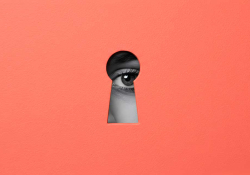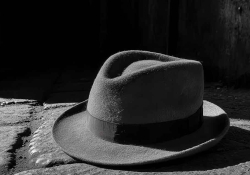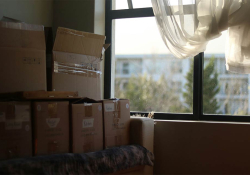Lucilla

Two sisters, one childhood, two versions—and a green sweater. In Anna Voltaggio’s “Lucilla,” the lives of two sisters trace corresponding arcs from childhood to adulthood, offering two different accounts of a single shared history.
The bathroom mirror has a corona that will no longer go away. For years my image has been fading at the neck, and it seems as if my head is independent of my body. Instead, I focus on the knit dress I’m wearing, which is a dusky autumn color.
“Do you think it looks good on me?” I ask Stefano, who is tightening the screws on the table.
“You look radiant.”
“But does the dress look good on me?”
“Sure, it looks terrific on you.”
“If I put on another one, you’d say the same thing.”
“I don’t know. Put it on and we’ll see.”
“Do you think Sarah and I are very different?”
“Physically?”
“In general.”
“You’re different, yes.”
“Do you find her radiant too?”
“We should buy a new table.”
“I saw one in that store on Via Dante that sells new and used stuff.”
“The one on the corner?”
“I’m not asking you if she’s better looking.”
“She has a certain appeal, but you’re better looking.”
“I’m only asking to see how alike we look. I’m not competing.”
“Lucilla, you’re sisters. You’re almost the same age. You look alike.”
“A lot?”
“Yes.”
Sarah is my opposite. Our physical resemblance is a joke; our mother was constantly getting our names wrong. “Sarah?” “Lucilla, Mom.”
She bought us the same clothes to make us feel equal and hide her favoritism, her unbounded love for Sarah. We went to church in identical plaid skirts and white blouses; we went to the park wearing matching corduroy pants; we went to school wearing the same blue smocks.
Our closet and drawers were a fixation.
Today we couldn’t dress more differently. Sarah doesn’t know who she is and only wears neutral, cool colors: black mostly, sometimes gray or bluish tones that never warm to blue-violet.
I keep a close eye on who I am; I stay within my reasonable bounds even when I dress. Sometimes it pains me to have to give up something I like, but I don’t talk about it or let it show.
Sarah and I slept in a room that was barely big enough for one person, and my bed was a roll-out one. Every night I would get down on my knees and stick my little fingers into the frame grip to pull it out; in the morning it would disappear under Sarah’s bed again. Even today when I phone her in the morning, I picture her on our childhood bed, higher than mine, the edge of the quilt with the bee pattern hanging down at my chin.
Today I call her early. It’s kind of a tradition that I wish her a happy birthday first, not that there has ever been a spoken pact or promise, but, well, it’s been this way for so many years, and every morning on October 19 she wakes up with my birthday greeting, as if it were my duty to remind her that this is the day she was born.
The sky is thick with dark, dense clouds when I arrive at Sarah’s house. Last week she called to tell me she was having a party.
“Forty-four is a number to celebrate,” she told me. Who knows why.
“Who’s going to be there?”
As I listen to her, I observe the orderliness of my kitchen, the polished, smooth oak countertop; the tin cookie jar next to an antique, never-used teapot; the glass oil cruet alongside the jar of salt; the wooden spice rack hanging to the right of the stove, symmetrical to the edge of the steel hood. The order quiets me. The idea that everything can be perfected and harmonized silences a disturbance within me that’s agitating.
The idea that everything can be perfected and harmonized silences a disturbance within me that’s agitating.
My home is the solid foundation of things.
Sarah recites a few names for me, most of whom I don’t know, and makes sure to point out that they are her family.
She uses the term family on purpose to irritate me, to emphasize that I am not part of it.
“Vita will be there too,” she says at the end.
“How come? I thought you didn’t want to see her anymore.”
“Just because.”
Sarah ends our conversations like she did when we were children.
I climb the stairs of this old building that has no elevator; the banister is grimy with dust, and some of the steps are cracked and uneven. I steady myself with one hand on the wall, afraid of falling.
When she opens the door she’s glowing, despite the slate-gray silk shirt she’s wearing as a dress; so flimsy as to be inappropriate for the season and out of place altogether. It barely covers her.
“Lucilla’s here!” she yells out, turning her head as if all those strangers were expecting me.
“Happy birthday,” I say, handing her a bottle of cabernet. When I lean over to kiss her, I’m hit with an intense wave of the scented oils she applies to her wrists and neck with a dropper. I don’t use perfume; I like the way I smell even when I’m sweating.
“Wine brought by a teetotaler is worth twice as much.”
“I also have a gift, for that matter.”
“You must really love me then,” she says with a nasty smile.
*
In the living room I feel like I’m intruding, as if every inch of space were already occupied in a seamless connection and I’m the odd man out. They all look at me. I take my time making my way through to pique their curiosity. The lights are dimmed and there is music in background: the Smiths or Blur, maybe, I don’t know, it sounds like that type of British rock. I don’t know it well.
I shake a few hands, tilt my head, smiling, at those farther away. They tell me their names; I don’t hear any of them. A couple comes in from the kitchen, and a man touches my shoulder saying, “Hi, Lucilla,” as if he knows who I am. I distinguish them by their details: hoop earrings, salt-and-pepper hair, long skirt, rings, mermaid tattoo, cigarette, vest, red lipstick, chin scar. Not knowing where to sit, I take a few steps without going in any direction. I take off my overcoat and hold it.
“You can put it in my room, on the bed,” says Sarah, opening the wine.
*
I don’t even turn on the light. A pile of coats and jackets takes up three-quarters of the bed, purses and backpacks are scattered more or less everywhere—on the floor, on the dresser, and on the nightstand. I leave my raincoat in a free corner but hold onto my bag. In the dimly lit room there’s a print of Frida Kahlo in a severe pose, with a small altar on a shelf beside it. On the altar is a saint with clasped hands and docile eyes, decorated with garlands. Sarah believed in God for a few years and keeps that saint as a souvenir.
We are very different. For example, she likes birthdays, even other people’s birthdays. When we were children, she looked forward to mine, too, as if it were her own.
Sarah doesn’t think about time passing or even about the time remaining. She acts as if she were always discovering something new, whereas I live as though I’ve lost something or put it somewhere I can’t remember. Nostalgia for Sarah is an abstruse sentiment, and she seems to exist in a future that is constantly at her fingertips.
Not me. I live in a present, even, steady repose, in a placid sameness that cannot be interrupted. I am lucid in this sameness, and I protect it.
One day, during a painful discussion about her supposed faith in God, I said to her:
“I’m not lacking anything.”
“You lack courage.”
Sarah knows nothing about courage. To be happy takes a lot of it.
She thinks that everything can be decided spur-of-the-moment. She doesn’t know how to reflect before acting, and believes the world will always absolve her, but her constant extemporization is just a never-ending wait.
Sarah is an actress who plays her own life; her ideas are fictional, her aspirations imaginary. Sarah performs the role of Sarah who believes in God, Sarah who loves her nephew Erri, Sarah who fights for women’s rights, Sarah who loves a woman, Sarah who celebrates a birthday and throws a party.
Sarah is an actress who plays her own life; her ideas are fictional, her aspirations imaginary.
Before leaving the bedroom and going back to the living room full of people, I go over to the altar on the shelf and, with a quick, sure gesture, grab the saint and slip it into my purse.
I am exactly what I am, animal, alive, thief.
I never steal in stores or supermarkets; I would take no pleasure in it. I don’t steal money or jewelry. What makes my blood throb are memories, ideas, failures, scraps of intimacy. They excite me to the point where I can’t help myself.
When I feel the impulse, a kind of suspension of time that reconnects me with myself and makes me whole again, I become edgy. I never have regrets or anxiety; I accept my nature for what it is, because I’m not interested in being anything other than what I am.
*
“There you are. Where did you disappear to?”
“Have you opened the gift?”
“Not yet.”
People come and go from the kitchen carrying bowls of hummus, pâté, and dipping sauces that they place on the large low table between the two couches.
“Would anyone like some pasta?”
“Oh no, no,” several overlapping voices chorus at once, reaching for the carrot sticks. They pass around the bowls and toast with my cabernet.
This evening Sarah is obsessed with making a display of cheerfulness. She shows off her beautiful legs, crosses them, caresses them. I imagine she’s doing it mainly for Vita, who is near the window, smoking; I wonder again why Sarah invited her. Vita is with a man who is looking at her as if she were the only creature in the whole world, and this image makes me shiver.
The open bottles proliferate, and a man sitting on an armrest—who has everyone’s attention—is telling them about having strangled an old hen at his country house the day before.
“We should go back to living in nature,” says Sarah. “We all need it.”
Why does she say things like that, I wonder.
I’ve never loved nature; I don’t know why. When I hear it described as redemptive, I have the opposite feeling. Its indifference is aggressive and harsh; it appalls me.
I sit in the violet velvet armchair, slip my hand into my purse, and grip the statuette of the saint; I feel a kind of pleasure and pain, a powerful sensation that goes right to the center of my body. I feel like touching myself.
I take a piece of flatbread, smear pâté on it as if nothing had happened; I’m a thief in my sister’s house and no one knows it.
“We used to spend summers in the country,” Sarah says, seeking my eyes for a moment. “Remember Uncle Sante waking us up at 5:30? He used to make those sugar-free cookies that we would hide in the cracks in the walls.” Her friends laugh. “You had a thing with that puny odd-job guy.” She laughs. “I don’t think there were any chickens, though. Right, Lucilla?”
She speaks in a toneless voice, a steady, neutral, clear monotone that is ambivalent. I smile at her without answering.
There were chickens. We are so different.
Her memory is a jumble of situations and feelings that she constantly reshapes; mine is like a cabinet chock-full of drawers with specific, independent memories.
Her memory is a jumble of situations and feelings that she constantly reshapes; mine is like a cabinet chock-full of drawers with specific, independent memories. I open a drawer and we are playing who-can-jump-the-most-steps in front of the church door. Our mother is standing near a marble bench, talking to a friend and showing her a ball of yarn that she will use to knit a sweater for Sarah in the coming days.
My sister gets ready to jump five steps. Putting one foot forward and one back, she squeezes her eyes shut, bends her knees slightly, and jumps. When she lands on the ground, she loses her balance and ends up on her knees on the paved walkway. She didn’t hit hard; she was already on her feet. She just tumbled over at the very end. She starts crying. Our mother, startled, drops the ball of green yarn into her friend’s hands as if it were red-hot, runs to Sarah, and puts her arms around her. Our mother wipes away Sarah’s tears until she stops crying.
That’s why the sweater will be made for her, because she fell in front of the church.
I open another drawer and there’s the night I held Erri in my arms for the first time. I got out of bed and he was awake, lying quietly in the hospital’s transparent crib. I stood at the window of the room with him, and, outside, all the world was still, the streets glistening with rain, a yellow moon neither crescent nor full.
It’s you and me, Erri. Such a simple fact, immense.
I open another drawer and there’s Stefano coming up behind me and covering my eyes as I sit at the table in the restaurant, waiting for dessert.
“Don’t look,” he says, leaning close to my ear. “Just listen.”
And I laugh, and put my hands over his, but he keeps them firmly over my eyes.
“Will you marry me?”
And I say yes, as if it would provide a happy ending.
*
I look around. Sarah’s house is chaotic; she likes to juxtapose different elements, woven kilims, plexiglass chairs, a cuckoo clock. Mine is elegant and uncluttered; there are always fresh flowers in a vase—freesias or dahlias. I only buy freesias or dahlias.
The others in the room are all talking—some are standing and I can’t hear a thing, a small group of women stayed in the kitchen making gin and tonic with fresh rosemary, but the main group is around the low table commenting on the stories told by the man who strangled the hen, whose name is Roberto. Now he’s entertaining them with episodes from his romantic relationships.
“And at some point she says to me, ‘Are you sure we hadn’t already slept together?’ ‘Wait,’ I say, ‘are you the one who used to work at Blend Bar?’ ‘Yes!!’ So after fifteen years I found myself sleeping with the same woman. That must mean something, right?”
The woman with the mermaid tattoo claps her hands and laughs. They all think it’s very funny and wait for the punch line.
“Moral of the story: I left everything to go and move in with her, and of course it was a fiasco. After six months it was over, and I was once again homeless and alone, with nothing to show for it.”
Roberto says that after that last of many failures he decided to give up life as a couple, and started going to private parties where he discovered the only sex that really interested him: anonymous group sex with no rules.
“There was this woman,” he says, “who as soon as she set foot in the house magnetized me. She had an eroticism about her that made the whole atmosphere vibrate. I walked up to her, wearing this little black mask that made me look like a dick, and I took her by the hand. She followed me to a rather large room with just an empty bed in the center, white silk sheets, lavender walls. She follows me without a word and lets me undress her like a queen. When she’s completely naked she takes my mask off and says, ‘I’m not interested in being here with you.’”
The story leaves everyone wordless. Someone tries to make a joke that falls flat, and I get up because I don’t see Sarah anymore.
I don’t know exactly what time it is; I want to leave.
Erri has school tomorrow morning, Bakunin still has to be fed, and no one will have changed his litter box. Erri always wakes up irritable, like his father. Whenever I imagine my life differently, I think I would free myself of Stefano’s grumpy face in the morning. Then I think of Erri. Some things must necessarily be a part of us.
Sarah is talking to Vita.
“I’m leaving. It’s getting late,” I tell her.
“I was happy to have you here. Wait! I’ll open the gift before you go.”
She unwraps the present without ripping the paper.
It’s the two of us in a silver frame. We’re eleven years old. Sarah looks at me with a dour smile.
“It’s great,” she says. “Look at those faces!”
“Yes, it’s rather touching.”
“You’re wearing the green sweater mom made you when you fell down in front of the church,” she says.
I look at her as if she were joking with me.
“You were the one who fell that day.”
“Can’t you see you’re wearing the green sweater?”
I look at her pityingly, and laugh hysterically.
Translation from the Italian
Editorial note: From La nostalgia che avremo di noi (Neri Pozza, 2023). English translation © 2024 by Anne Milano Appel.

















